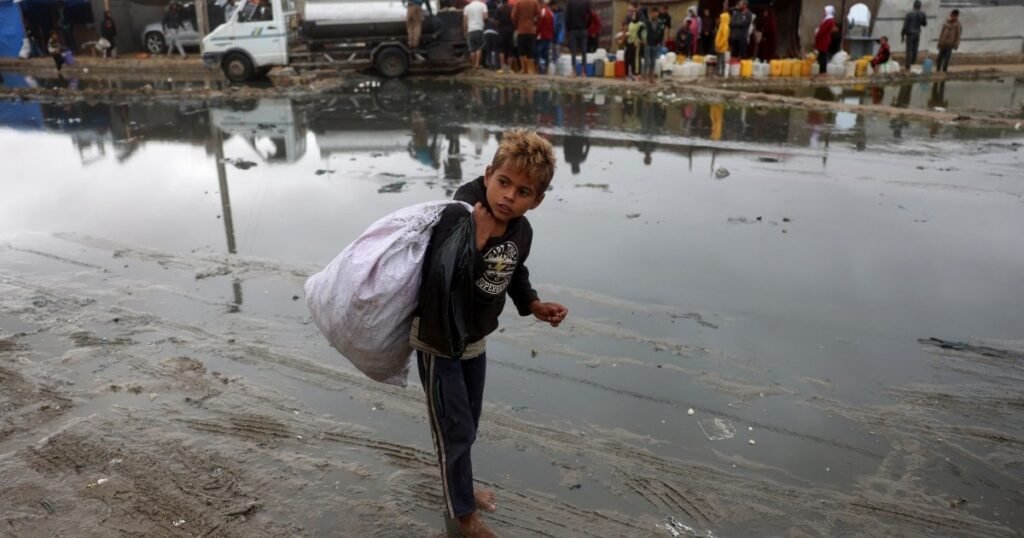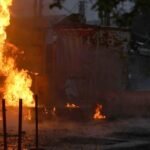Winter used to be a popular season in Gaza. It was believed to bring “khayr” and “baraka” – goodness and blessings. Both children and adults looked forward to the beginning of the cold season to recover from the summer heat.
When the rain finally came, the children rushed into the street and joyfully sang “Shatti ya doniya shatti, wa arawi kul al-aradi, li-yazraa al-falah khokh wa roman wa tufah” – “Rain, world, rain and water. “The whole land so that the farmer can grow peaches, pomegranates and apples.”
The rains were actually a blessing for water-scarce Gaza. Farmers would welcome them and begin preparations for the new harvest season. The markets would be full of locally grown vegetables such as spinach, lettuce, carrots, cucumbers and fruits such as oranges, kiwis, persimmons and strawberries.
For city dwellers, the rainy days would be a time to relax at home, snuggling under warm blankets or gathering around a fire to make tea or sip “Sahleb” – a sweet drink made from milk, starch, grated coconut and nuts.
On the evenings when power was restored, families sat comfortably in front of the television and watched a film or soap opera.
On cold and dry days, many ventured to the coast, enjoyed a walk or met up with friends. The scent of sweet grilled corn and chestnuts would fill the air. Many would also stop by the famous dessert shop “Abu Al Saoud” to enjoy a warm kunafeh – either the nut-filled Arabic variety or the cheese-filled variety called Nabulsia.
Those winters in Gaza now seem like a distant past. Abu Al Saoud’s shop no longer exists. There are no cozy gatherings and nice conversations, no Sahleb, no television. When it rains, there are no children singing “Shatti ya doniya shatti” outside.
This year winter brought neither Khayer nor Baraka. It brought more suffering and utter despair.
The rain was a curse. People are praying for dry weather and fearing what impact flooding could have on refugee camps.
The sound of thunder has become similar to the sound of bombs – it scares you. Many Palestinians have no place to shelter from a storm. Aid groups say at least a million people lack basic protection from winter weather.
Makeshift shelters are made from textiles, tarpaulins, blankets, cardboard and even old rice sacks. They can hardly withstand wind and rain. Families have to stay awake at night, desperately holding onto their tents to keep them from blowing away as water rushes in from below, soaking their mattresses, blankets and other belongings.
Often the accommodation is so poor that the rain destroys it, plunging families who have already lost everything into despair. Prices for tents and materials to build makeshift tents have skyrocketed, leaving those whose shelters are blown up or washed away left exposed to the elements.
Some are so desperate that they return to their bombed-out homes to seek refuge. Even if the building is so badly damaged that it could collapse at any moment, the people remain inside and have no other choice.
Keeping it warm is also almost impossible. Wood has become unaffordable for many; 1kg now costs $9. If you can’t afford it, you have to search for it yourself – an exhausting and grueling task. Even if there is enough wood for a fire, it is not enough to keep a family warm throughout the freezing night.
What makes the winter cold even more unbearable is hunger. Food prices in Gaza have skyrocketed since October. A bag of flour costs up to $200. Meat and fish have completely disappeared from markets; Vegetables and fruits are scarce and available at exorbitant prices.
Bakeries have closed because they don’t have supplies for baking. UNRWA and the World Food Program, which normally serve the most vulnerable, are unable to meet demand. Soup kitchens distribute meals of chickpeas, lentils and rice, but each family only gets one plate, barely enough for one person.
At night in every refugee camp you can hear the cries of hungry children begging their parents for food.
The memories of the warmth and joy that once filled homes in winter in Gaza have faded. In the cold there is despair and misery. There seems to be no end to the suffering of the Palestinian people. So many survive with the flickering hope that the war and genocide will end, that food will be available again and people will have adequate shelter. This Khayr and Baraka will one day return to Gaza.
The views expressed in this article are the author’s own and do not necessarily reflect the editorial stance of Al Jazeera.





